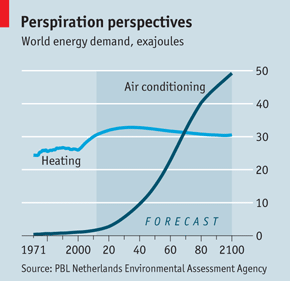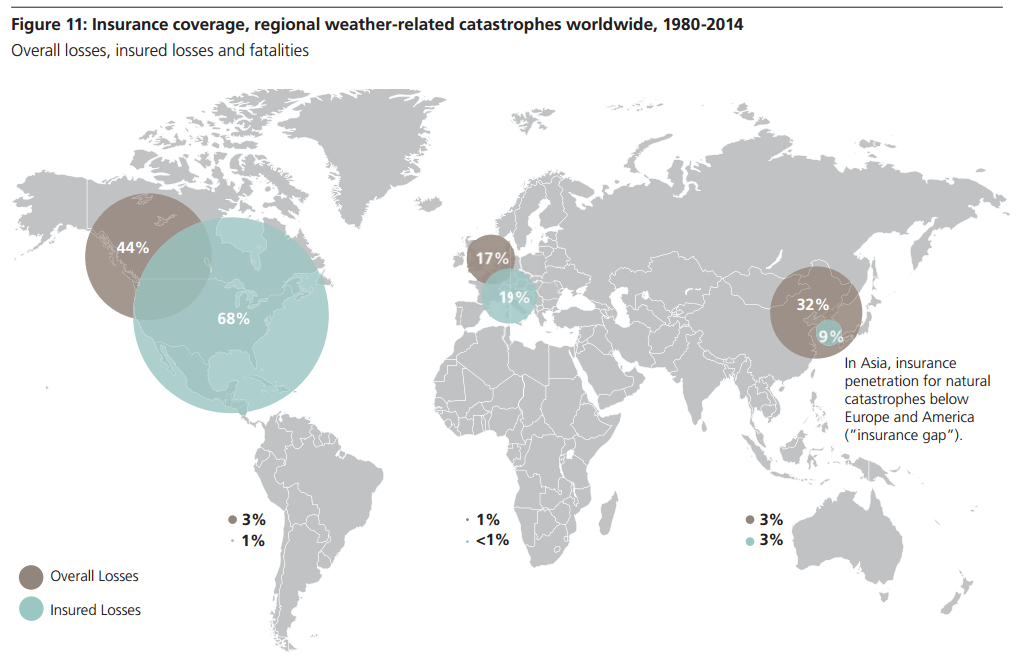How climate change could damage the middle class

'More fear, less fun' ... global warming and middle-class wealth are directly related, says UBS Image: REUTERS/Shannon Stapleton

Get involved with our crowdsourced digital platform to deliver impact at scale
Stay up to date:
Cities and Urbanization
The way the world’s middle class copes with climate change could present a risk to social stability and economic growth, according to a new study by Swiss bank UBS.
The year 2015 was a landmark for climate change, with the Paris Agreement seeing nations sign up to keep global temperature increases below 2 degrees Celsius. However, without the promised action, global warming will have far-reaching and significant effects on the world’s population. Estimated to be at least 1 billion strong, the middle classes represent a significant sector of this population.
UBS argues that the impact of climate change on the middle class is an understudied, but potentially important, area. They see this demographic as a dynamic social group, with significant assets but also willing to take action to protect their economic and social status. The report looks at how exposed they are to the risk of climate change, and how they are adapting.
What impact is climate change having on the middle classes?
The study takes a sample of 215 cities, in 15 countries, and at different stages of economic development. It examines the link between temperature-related mortality and flood risk in these cities, and the economic behaviour of middle-class households.

Middle-class spending patterns in cities that are more exposed to the risk of climate change are noticeably different. These cities includes major global centres from Los Angeles to Tokyo, Mumbai to Shanghai and Taipei. Here, the middle classes spend more of their household budget on housing, and less on leisure and recreation. In the United States, those living in the highest-risk cities can spend up to $1,600 more per year on housing.
This has the potential to significantly reduce the wealth of the middle class, as they have to spend more on protecting themselves, and recovering from, from the impacts of climate change.
As the report says, “more fear, less fun”.
The middle class is also making increasing use of air-conditioning. Sales of these units have doubled in China since 2010. This has the potential to create a vicious cycle, as energy consumption and emissions from increased usage add to climate change.

Source: The Economist
Increasing temperatures also carry the risk of increasing mortality. Research suggests that by 2050, the average American will experience 27-50 days over 35 degrees Celsius every year. As the global population ages, this is of particular concern.
Why are the middle classes so important?
As middle-class wealth erodes, there could be a significant impact on the global economy. The report sees cities as future centres of middle-class populations. Today, cities generate around half of global GDP. However, as the risks faced by urban middle-class populations increase, so too does economic instability.
This risk will be particularly keenly felt in Asia, where rates of urbanization are highest. Asian nations are among the most affected by weather-related disasters. However, levels of insurance remain low. Between 1980 and 2014, just 9% of losses in Asia were insured. Even in the US, a third of losses were uninsured.

Source: UBS
Lack of protection increases the economic consequences of disasters caused by climate change. This risk could be felt not only locally, but also on a global level. Equally, economic development will increase the volume and value of infrastructure, especially as the middle-class population increases. In turn, this will increase financial losses.
However, there are potential positive outcomes. A Pew Research Centre study has shown that globally, people are concerned by climate change, and believe they will need to change. UBS cite the relative political and social power of the middle class, which could see them increase calls for climate action. Pressure applied to governments and other organizations could increase efforts to limit emissions.
The report concludes that “the forces that make the middle class suffer and adapt to climate change are the same forces that are likely to stir the middle class to political activism”.
Plenty of concern then, but also hope.
Have you read?
Which are the deadliest weather disasters
Which countries are most vulnerable to climate change?
Is the world prepared for future disasters?
Author: Joe Myers is a Digital Content Producer at Formative Content
Don't miss any update on this topic
Create a free account and access your personalized content collection with our latest publications and analyses.
License and Republishing
World Economic Forum articles may be republished in accordance with the Creative Commons Attribution-NonCommercial-NoDerivatives 4.0 International Public License, and in accordance with our Terms of Use.
The views expressed in this article are those of the author alone and not the World Economic Forum.
The Agenda Weekly
A weekly update of the most important issues driving the global agenda
You can unsubscribe at any time using the link in our emails. For more details, review our privacy policy.
More on Cities and UrbanizationSee all
Victoria Masterson
April 12, 2024
Victoria Masterson
April 11, 2024
Sam Markey and Andrew Watkins
April 5, 2024
H. Kit Miyamoto, Olivia Nielsen, Ommid Saberi and Guido Licciardi
March 27, 2024
Victoria Masterson
March 26, 2024
Lisa Chamberlain
March 25, 2024






